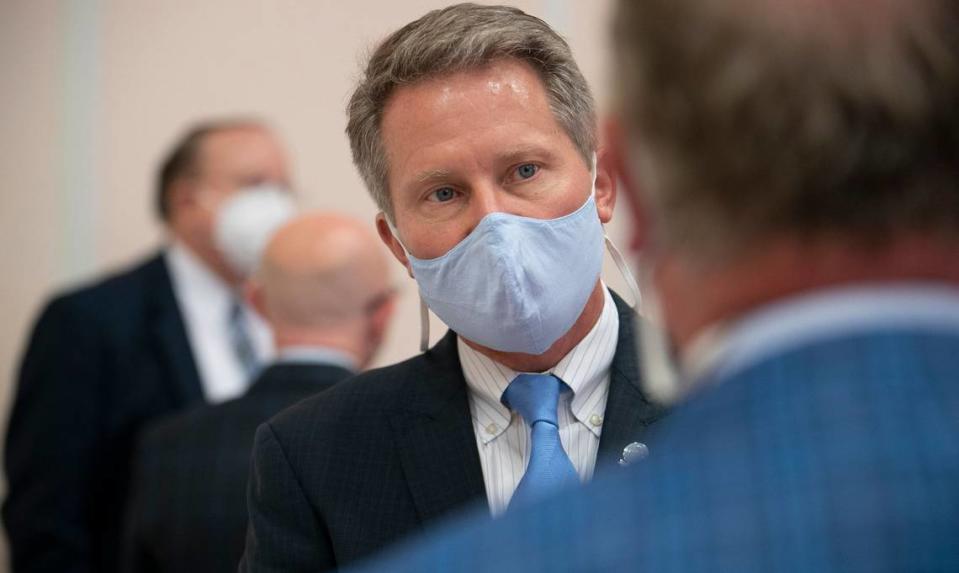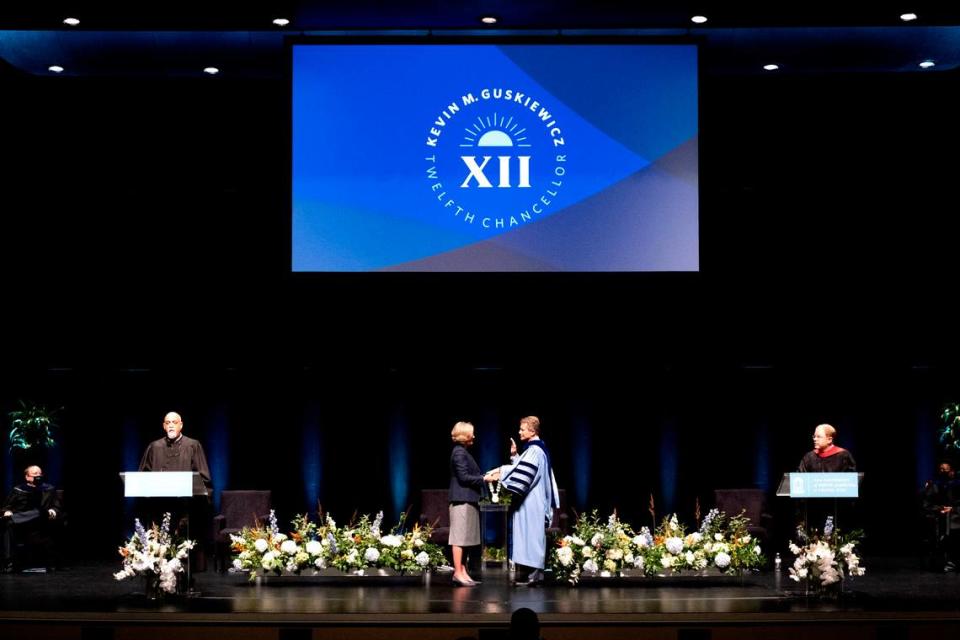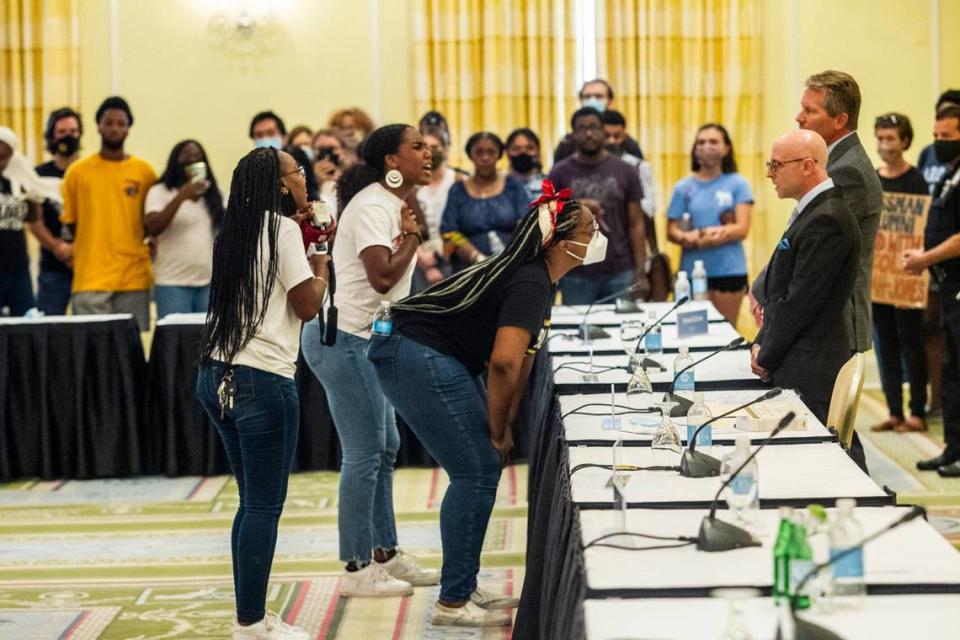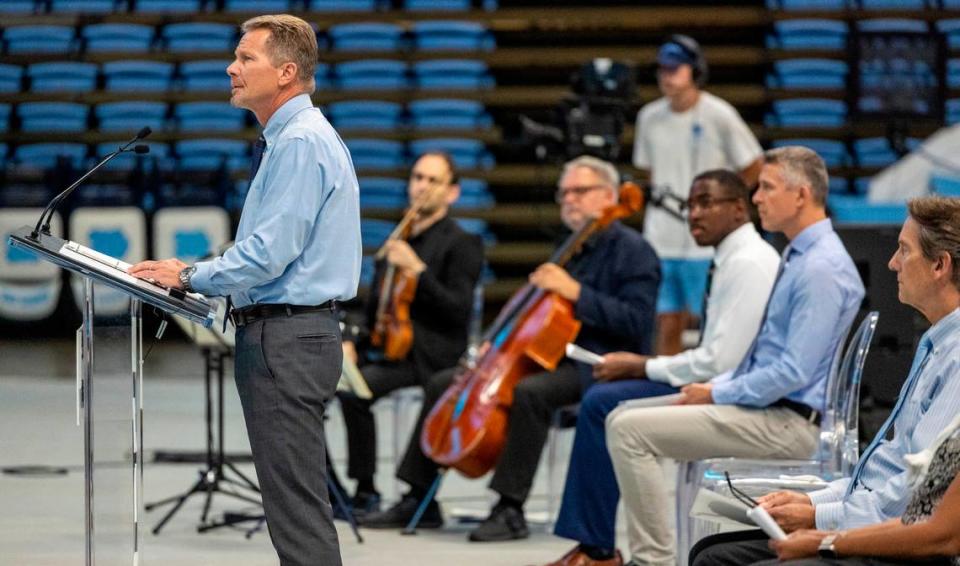UNC chancellor is considering leaving. Here are key moments from his time in Chapel Hill.
- Oops!Something went wrong.Please try again later.
UNC-Chapel Hill Chancellor Kevin Guskiewicz announced he is considering leaving the university to become the president of Michigan State University.
Guskiewicz first came to Carolina in 1995 as a faculty member. He served as the dean of the university’s largest academic unit, the College of Arts & Sciences, for three years, then became UNC’s 12th chancellor in 2019 and led the university through a series of controversies.
As Guskiewicz continues “weighing” the possibility of leaving UNC, here are key moments from his time as chancellor.
Timeline of Kevin Guskiewicz’s chancellorship
▪ February 2019: Following then-Chancellor Carol Folt resigning from her position in January, then-interim UNC System President Bill Roper appointed Guskiewicz to the position on an interim basis. Folt, who ordered the removal of the Silent Sam Confederate monument upon announcing her resignation, had planned to leave the university at the end of the academic year, but the UNC System Board of Governors gave her only until the end of January.
As interim chancellor, Guskiewicz inherited the controversy over Silent Sam, which had been the subject of contentious on-campus protests for years.
▪ November 2019: The controversy over Silent Sam continued with the Board of Governors brokering a closed-door deal to settle with the Sons of Confederate Veterans over the statue. The small group behind the deal included a UNC vice chancellor.
The deal, which was later overturned by a judge, would have given the Confederate group $2.5 million to care for and preserve the monument. Guskiewicz told The Daily Tar Heel in 2021 that the vice chancellor worked on behalf of the Board of Governors in that deal, not on behalf of Guskiewicz.
▪ December 2019: Guskiewicz was named chancellor with a unanimous vote by the Board of Governors.
“As chancellor, I will shine an honest and stark light on our campus, and I will act on the challenges that we face,” Guskiewicz said during a ceremony. “On the other side of every challenge is an opportunity, and we’ll find them and act on them.”

▪ March 2020: Amid the rise of the COVID-19 pandemic, UNC announced it would extend the university’s spring break period to prevent the spread of the virus and begin offering remote instruction.
“There is no set end date to this new arrangement,” Guskiewicz said in the announcement. “We will constantly revisit and reevaluate our policies as the situation around COVID-19 evolves.”

▪ August 2020: After shifting to remote instruction for the remainder of the spring 2020 semester, the university opted — despite warnings from health officials and pleas from faculty — to bring students back to campus, with modifications due to the pandemic, in the fall.
The plan lasted only one week. Citing rising case numbers on campus, Guskiewicz announced the university would pivot back to remote instruction for undergraduate students.
▪ October 2020: Guskiewicz was installed as chancellor in a socially distanced ceremony that was streamed virtually due to the ongoing pandemic.
In his remarks, Guskiewicz said serving as chancellor at UNC would be “the opportunity of a lifetime.”

▪ June 2020: As the country confronted a racial reckoning in the wake of the murder of George Floyd, the UNC Board of Trustees voted to lift a 16-year moratorium on the renaming of campus buildings.
▪ July 2020: The Board of Trustees voted, upon a recommendation from Guskiewicz, to rename three buildings due to the original namesakes’ ties to white supremacy and racism.
“Continuing to honor these men is antithetical toward our work in building a diverse and inclusive community,” Guskiewicz said at the time.
▪ February 2021: A group of professors in the university’s chapter of American Association of University Professors (AAUP) called for Guskiewicz to resign, citing the revelation that the university took part in negotiating the Silent Sam settlement with the Sons of Confederate Veterans.
Guskiewicz, in a statement, reiterated he didn’t approve the deal, but was “aware discussions were occurring through the UNC System.” He said his priority at the time was to “permanently remove the monument from campus.”
▪ May 2021: Award-winning journalist Nikole Hannah-Jones, known for her creation of the 1619 Project, was in April named the Knight Chair in the UNC-CH Hussman School of Media and Journalism, a position that has historically been tenured.
But in May, it was revealed that Hannah-Jones was never offered tenure and instead was offered a fixed term with the option of being reviewed for tenure within five years.
That revelation set off months of controversy and protests at the university, with many faculty and students demanding the Board of Trustees offer Hannah-Jones tenure before her start date.
▪ June 2021: About one week after Hannah-Jones said she would not join the faculty without tenure, the Board of Trustees voted, 9-4, to grant Hannah-Jones tenure.
▪ July 2021: Hannah-Jones announced she would not teach at UNC, instead opting for a Knight Chair position at the historically Black Howard University. She said her decision, in part, was based on the lack of communication from university leaders to her throughout the process.
“It shows a severe failure of leadership,” she told The News & Observer at the time. “I think it’s going to be very difficult to convince the faculty that they have an advocate for what is in the best interest of the university because of the utter silence of what has happened here.”
Guskiewicz issued a statement that said he was “disappointed that Nikole Hannah-Jones will not be joining our campus community as a member of our faculty” and that he wished her the best.

▪ July 2022: Guskiewicz approved a settlement for $74,999 to avoid potential legal action by Hannah-Jones.
▪ June 2023: In a landmark decision that overturned decades of precedent on affirmative action in higher education, the U.S. Supreme Court ruled UNC’s race-conscious admissions policy unconstitutional following litigation that had lasted nearly a decade.
“Carolina remains firmly committed to bringing together talented students with different perspectives and life experiences and continues to make an affordable, high-quality education accessible to the people of North Carolina and beyond,” Guskiewicz said in a statement after the ruling. “While not the outcome we hoped for, we will carefully review the Supreme Court’s decision and take any steps necessary to comply with the law.”
▪ July 2023: About a week after the Supreme Court’s ruling, Guskiewicz announced plans to “expand opportunity” to attend the university, including by offering free tuition to students from North Carolina whose families make less than $80,000 per year, “beginning with the incoming class in 2024.”
The decision was met with resistance from the UNC System Board of Governors, many of whom said they had not been informed of the announcement ahead of time and found out about it in the media. The initiative did not require approval from the system board, nor the university’s board of trustees, because it will not use state-appropriated funds.
Board member Philip Byers said the timing could make it look like the university “is trying to use their authority and power to say, ‘Look at us, we can overcome even the Supreme Court of the United States.’”
“Our communication of the rollout could have and should have been better,” Guskiewicz told board members. “For that, I’m sorry.”
▪ August 2023: UNC’s fall semester began with tragedy, as a graduate student at the university allegedly fatally shot professor Zijie Yan on Aug. 28, just one week into the start of classes. The event sent the university into lockdown for more than three hours.
Guskiewicz led a vigil for the slain professor, saying “our sense of security and safety was pierced, but it is together with one another that we can find healing.”

▪ September 2023: Less than three weeks after the Aug. 28 fatal shooting, UNC went into lockdown a second time after a man allegedly brandished a gun at an on-campus bagel shop.
“It’s sad and alarming that there have now been two lockdowns over the past 16 days on our campus where we’ve had to apprehend individuals who have violated the safety and well-being of our community,” Guskiewicz said.
▪ November 2023: Guskiewicz confirmed he was “weighing” a decision on whether to become the next president of Michigan State University, following a report that he was the sole finalist for the job.
“I am focused on serving the University of North Carolina at Chapel Hill, a special place I have lived, worked, and loved for 28 years. I am very proud of what our university accomplishes every day as one of the best public universities in the country,” Guskiewicz said in a statement provided by the university. “Through the years, a variety of professional opportunities have been presented to me. My family and I must weigh each one, and we are weighing this one.”

